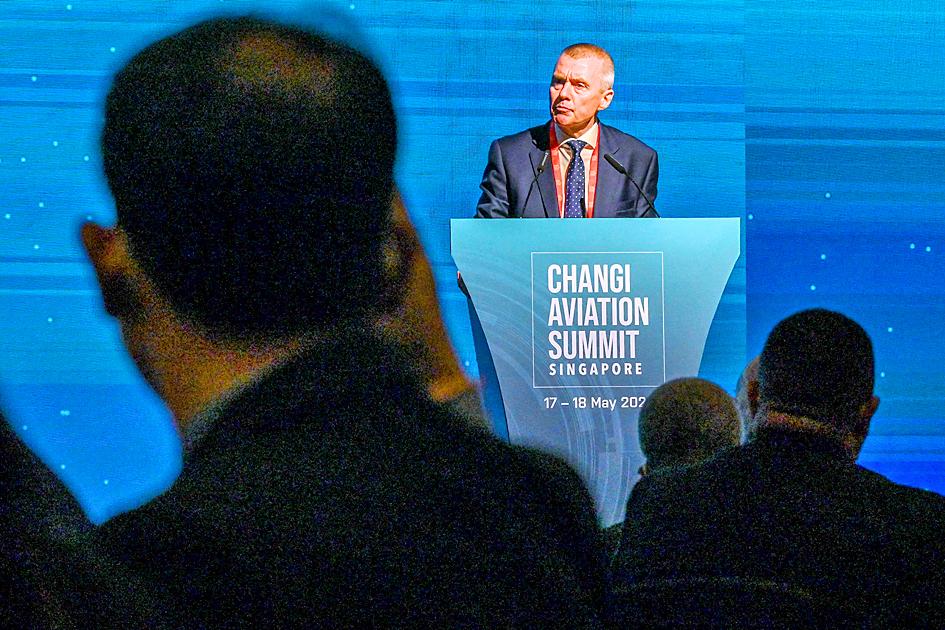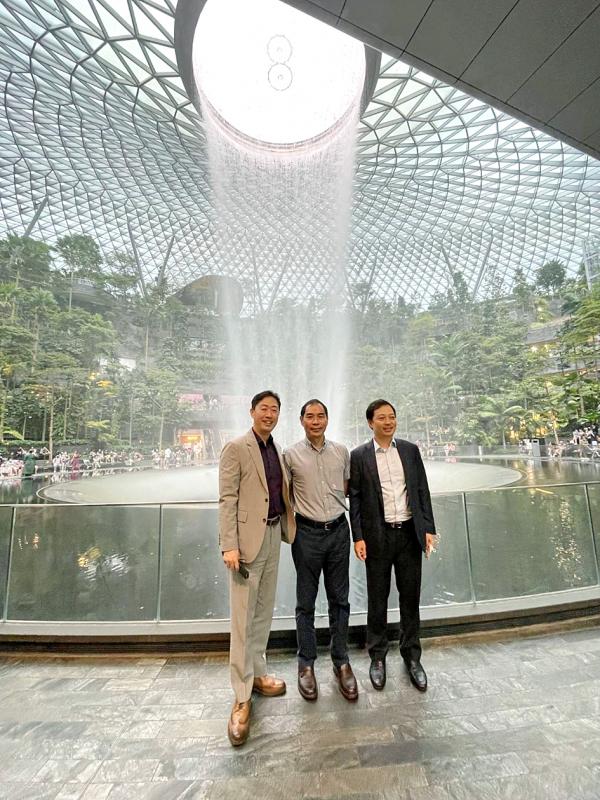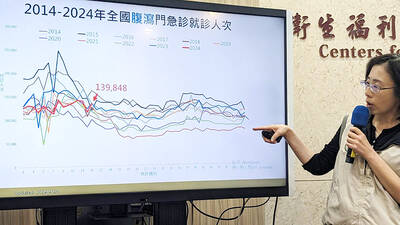China’s “zero COVID-19” policy would hamper the recovery of the civil aviation industry in the Asia-Pacific region, International Air Transport Association (IATA) director-general Willie Walsh told the Changi Aviation Summit yesterday.
“As long as the Chinese government continues to maintain their ‘zero COVID’ approach, it is hard to see the country’s borders reopening. This will hold back the region’s full recovery,” Walsh said in his keynote speech.
While Japan is also key to the industry’s recovery in the region and has taken steps to allow it, it lacks a clear plan to reopen to all visitors or tourists, he said.

Photo: AFP
Japan should “lift quarantine for all vaccinated travelers,” “remove both the on-arrival airport testing and daily arrival cap” and “take bolder steps towards reopening of the country’s borders,” he said.
Walsh identified the importance of the two countries while urging Asia-Pacific countries to further ease border measures to accelerate the region’s recovery from COVID-19.
“Asia-Pacific is playing catch-up on restarting travel after COVID-19, but there is growing momentum with governments lifting many travel restrictions. The demand for people to travel is clear. As soon as measures are relaxed, there is an immediate positive reaction from travelers,” Walsh said. “So it is critical that all stakeholders, including governments, are well-prepared for the restart. We cannot delay. Jobs are at stake and people want to travel.”

Photo courtesy of Taoyuan International Airport Corp via CNA
The Asia-Pacific region’s international passenger demand for March reached 17 percent of pre-pandemic levels, after having hovered at less than 10 percent for most of the past two years, he said, but government restrictions have prevented demand from recovering to 60 percent of pre-pandemic levels as seen in other countries.
Governments in the region should continue easing measures and bring normalcy to air travel by removing all restrictions for vaccinated travelers and lifting the mask mandate for air travel when it is no longer required in other indoor environments and public transport, he said.
Quarantine and COVID-19 testing for unvaccinated travelers should be removed in countries where there are high levels of population immunity, which is the case in most parts of Asia, Walsh said.
Minister of Health and Welfare Chen Shih-chung (陳時中), who heads the Central Epidemic Command Center, earlier this month reaffirmed that the nation’s borders could gradually reopen to international travelers in July, provided the borders are first opened to countries whose COVID-19 situations are similar to Taiwan’s and domestic medical facilities have the capacity to cope with an increase in COVID-19 cases.
In other news, Taoyuan International Airport Corp senior vice president Jerry Dan (但昭璧) yesterday told the 33th Airports Council International Asia Pacific Regional Board meeting in Singapore that the council can dispel travelers’ concerns, and boost the confidence of air passengers and carriers by making consistent suggestions to governments regarding regulatory and quarantine measures.
Overall average air passenger volume has reached only 30 percent of pre-pandemic levels, council director-general Stefano Baronci said.
Airports around the world still face many challenges, including COVID-19 passport checks, a shortage of airport workers and on-arrival COVID-19 testing, he added.

FLU SEASON: Twenty-six severe cases were reported from Tuesday last week to Monday, including a seven-year-old girl diagnosed with influenza-associated encephalopathy Nearly 140,000 people sought medical assistance for diarrhea last week, the Centers for Disease Control (CDC) said on Tuesday. From April 7 to Saturday last week, 139,848 people sought medical help for diarrhea-related illness, a 15.7 percent increase from last week’s 120,868 reports, CDC Epidemic Intelligence Center Deputy Director Lee Chia-lin (李佳琳) said. The number of people who reported diarrhea-related illness last week was the fourth highest in the same time period over the past decade, Lee said. Over the past four weeks, 203 mass illness cases had been reported, nearly four times higher than the 54 cases documented in the same period

A group of Taiwanese-American and Tibetan-American students at Harvard University on Saturday disrupted Chinese Ambassador to the US Xie Feng’s (謝鋒) speech at the school, accusing him of being responsible for numerous human rights violations. Four students — two Taiwanese Americans and two from Tibet — held up banners inside a conference hall where Xie was delivering a speech at the opening ceremony of the Harvard Kennedy School China Conference 2024. In a video clip provided by the Coalition of Students Resisting the CCP (Chinese Communist Party), Taiwanese-American Cosette Wu (吳亭樺) and Tibetan-American Tsering Yangchen are seen holding banners that together read:

Heat advisories were in effect for nine administrative regions yesterday afternoon as warm southwesterly winds pushed temperatures above 38°C in parts of southern Taiwan, the Central Weather Administration (CWA) said. As of 3:30pm yesterday, Tainan’s Yujing District (玉井) had recorded the day’s highest temperature of 39.7°C, though the measurement will not be included in Taiwan’s official heat records since Yujing is an automatic rather than manually operated weather station, the CWA said. Highs recorded in other areas were 38.7°C in Kaohsiung’s Neimen District (內門), 38.2°C in Chiayi City and 38.1°C in Pingtung’s Sandimen Township (三地門), CWA data showed. The spell of scorching

UNAWARE: Many people sit for long hours every day and eat unhealthy foods, putting them at greater risk of developing one of the ‘three highs,’ an expert said More than 30 percent of adults aged 40 or older who underwent a government-funded health exam were unaware they had at least one of the “three highs” — high blood pressure, high blood lipids or high blood sugar, the Health Promotion Administration (HPA) said yesterday. Among adults aged 40 or older who said they did not have any of the “three highs” before taking the health exam, more than 30 percent were found to have at least one of them, Adult Preventive Health Examination Service data from 2022 showed. People with long-term medical conditions such as hypertension or diabetes usually do not